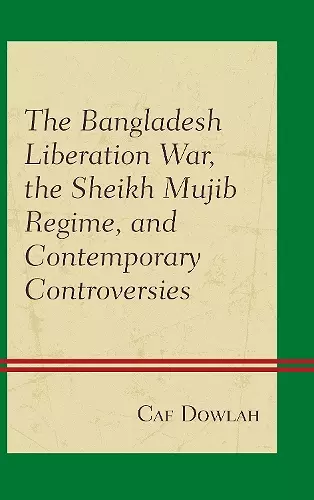The Bangladesh Liberation War, the Sheikh Mujib Regime, and Contemporary Controversies
Format:Hardback
Publisher:Lexington Books
Published:19th Oct '16
Currently unavailable, and unfortunately no date known when it will be back

The study provides an in-depth, up-to-date, and scholarly analysis of the liberation war and the Sheikh Mujib Regime of Bangladesh. Situating the emergence of Bangladesh in the broader historical context of the partition of British India in 1947, the study re-examines: a) how Mujib successfully galvanized the legitimate grievances of Bangladeshi people during the united Pakistan period (1947–71) and how a highly successful guerilla warfare of Bangladeshi people led to dismemberment of Pakistan in 1971 with crucial military and political support from neighboring India; (b) how in the post-liberation Bangladesh the Mujib regime toyed with contradictory political ideologies of democracy and socialism, and eventually ended up with a one-party monolithic rule; (c) how in the economic sphere the Mujib regime vacillated between petty bourgeoisie and socialist inclinations by half-heartedly pursuing socialization of agriculture and nationalization of industries, which resulted in plundering of the economy and plunging of millions of people in famine and near-famine situations; (d) how in 1975 the assassination of Mujib and collapse of his ill-fated regime, that failed to deliver both economically and politically, evoked little sympathy from the masses; and (e) how the trial of the killers of Mujib after 21 years of his death, and the trial of the collaborators of the liberation war after four decades of the country’s liberation war, orchestrated by Sheikh Hasina government, keep the nation’s political discourse still sharply divided.
Dowlah confirms the continued salience of the debate about the place of Sheik Mujib in contemporary Bangladeshi history and politics. This book will have special relevance for insiders who know the characters and wish to garner support for the various and sometimes contradictory interpretations of the liberation struggle and the first years of the country's independence under the charismatic leadership of its founding father, Sheik Mujibur Rahman. It also is an easy read for those who desire an insider's view of the 1971 struggle, the emergence of Bangladesh, and its aftermath. -- Shelley Feldman, Cornell University
Caf Dowlah's lucid and methodical study of the Bangladesh Liberation War and its aftermath offers a careful explication of one of the twentieth century's most triumphant and tragic struggles for independence. Eschewing over-determined historical analysis and the temptations of hagiography, Professor Dowlah offers a measured assessment of the charismatic Sheikh Mujib and his role in the struggle for Bangladesh. Balancing Mujib's skills as a nationalist torchbearer against his inability to deliver on the promise of economic and political reform, this book represents a valuable contribution to the flowering of new literature on the unlikely birth of a new South Asian nation. -- Benjamin Siegel, Boston University
ISBN: 9781498534185
Dimensions: 236mm x 159mm x 20mm
Weight: 431g
206 pages